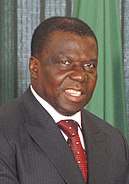Guinea-Bissau presidential election, 2005
|
|
|||||||||||||||||
|---|---|---|---|---|---|---|---|---|---|---|---|---|---|---|---|---|---|
|
|||||||||||||||||
|
|||||||||||||||||
|
|||||||||||||||||
João Bernardo Vieira
Independent
Presidential elections were held in Guinea-Bissau on 19 June 2005, with a second round runoff on 24 July. The elections marked the end of a transition to democratic rule after the previously elected government was overthrown in a September 2003 military coup led by General Veríssimo Correia Seabra. The result was a victory for former President and independent candidate João Bernardo Vieira.
Following the coup, a civilian government was nominated to oversee the transition and sworn in on 28 September 2003. Henrique Rosa was appointed interim President following talks with military, political, and civil society leaders, while Artur Sanhá of the Party for Social Renewal (PRS) was named Prime Minister.
A legislative election, delayed numerous times during the presidency of Kumba Ialá, took place on 28 March 2004. The poll was declared free and fair by election observers and the former ruling party, the African Party for the Independence of Guinea and Cape Verde (PAIGC), won a plurality of the seats. Ialá's party, the PRS, placed second, followed by the United Social Democratic Party (PUSD). PAIGC leader Carlos Gomes Júnior took office as Prime Minister in May 2004.
...
Wikipedia


